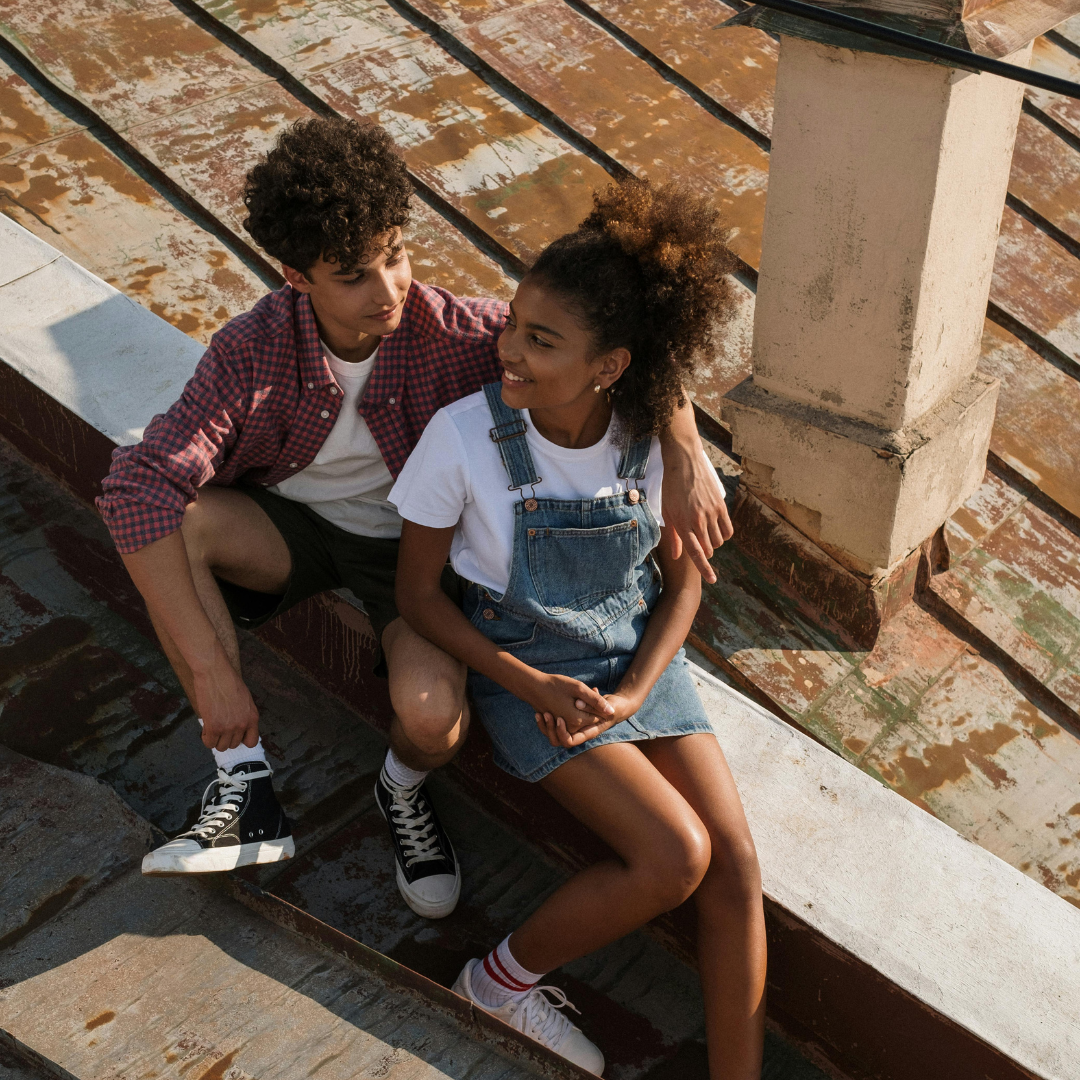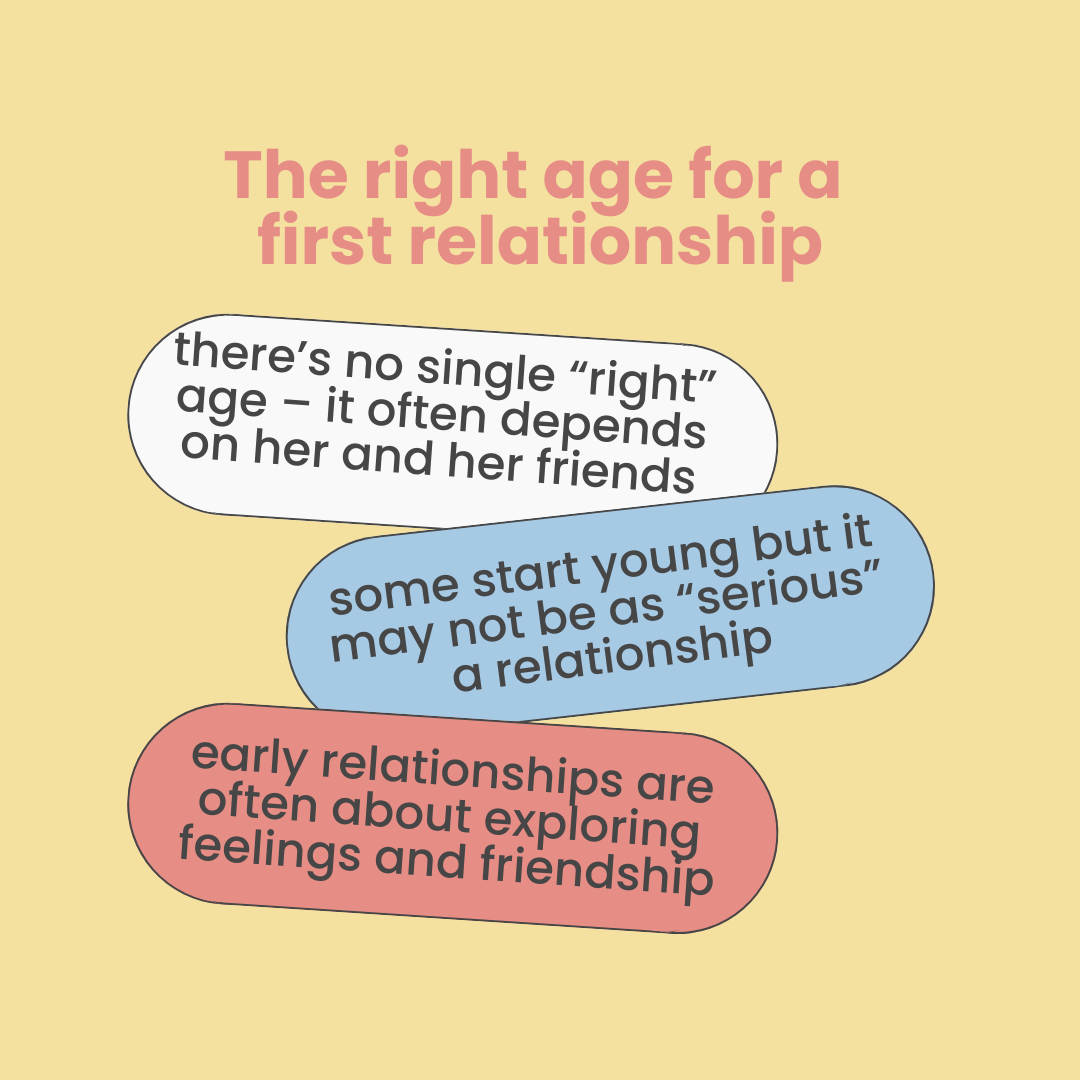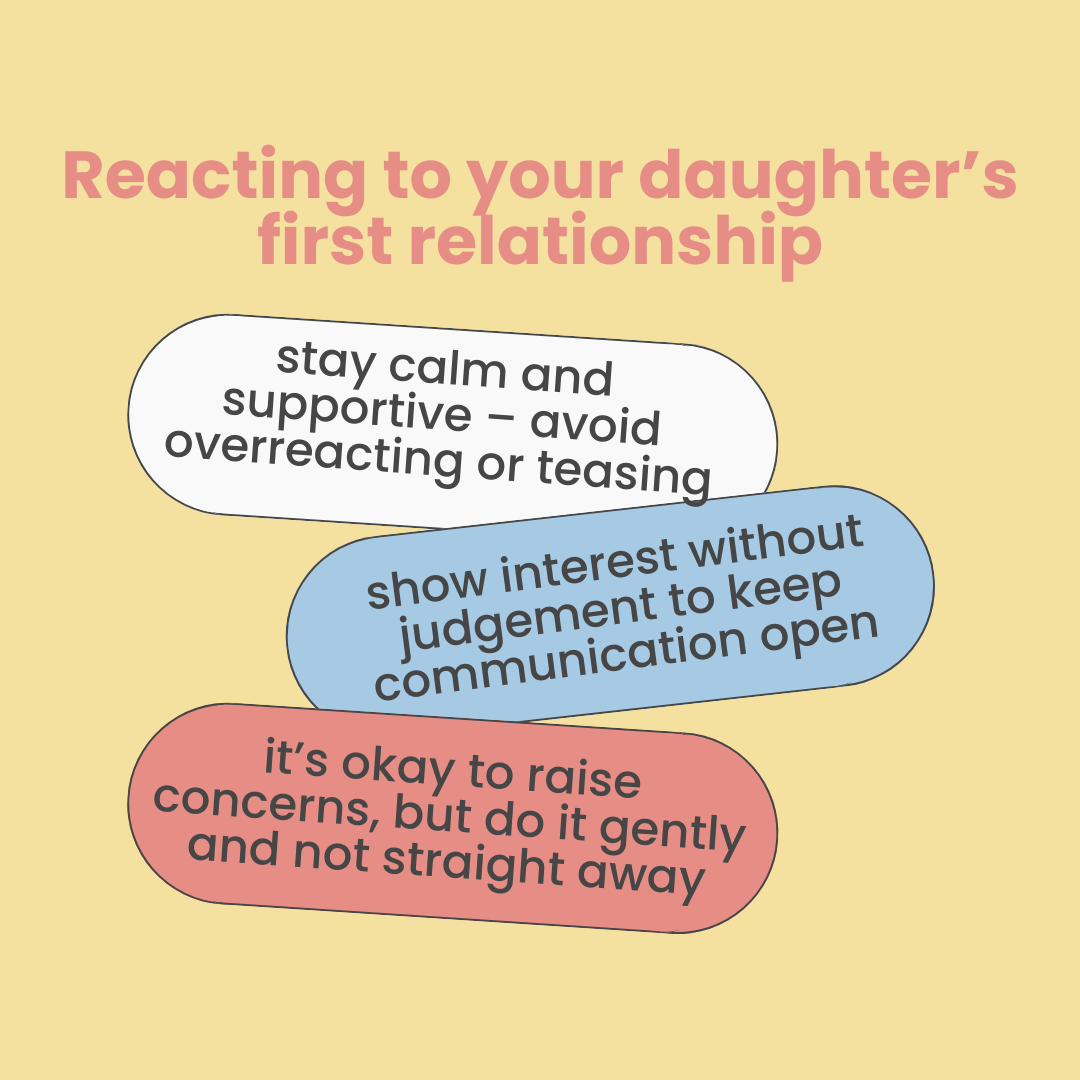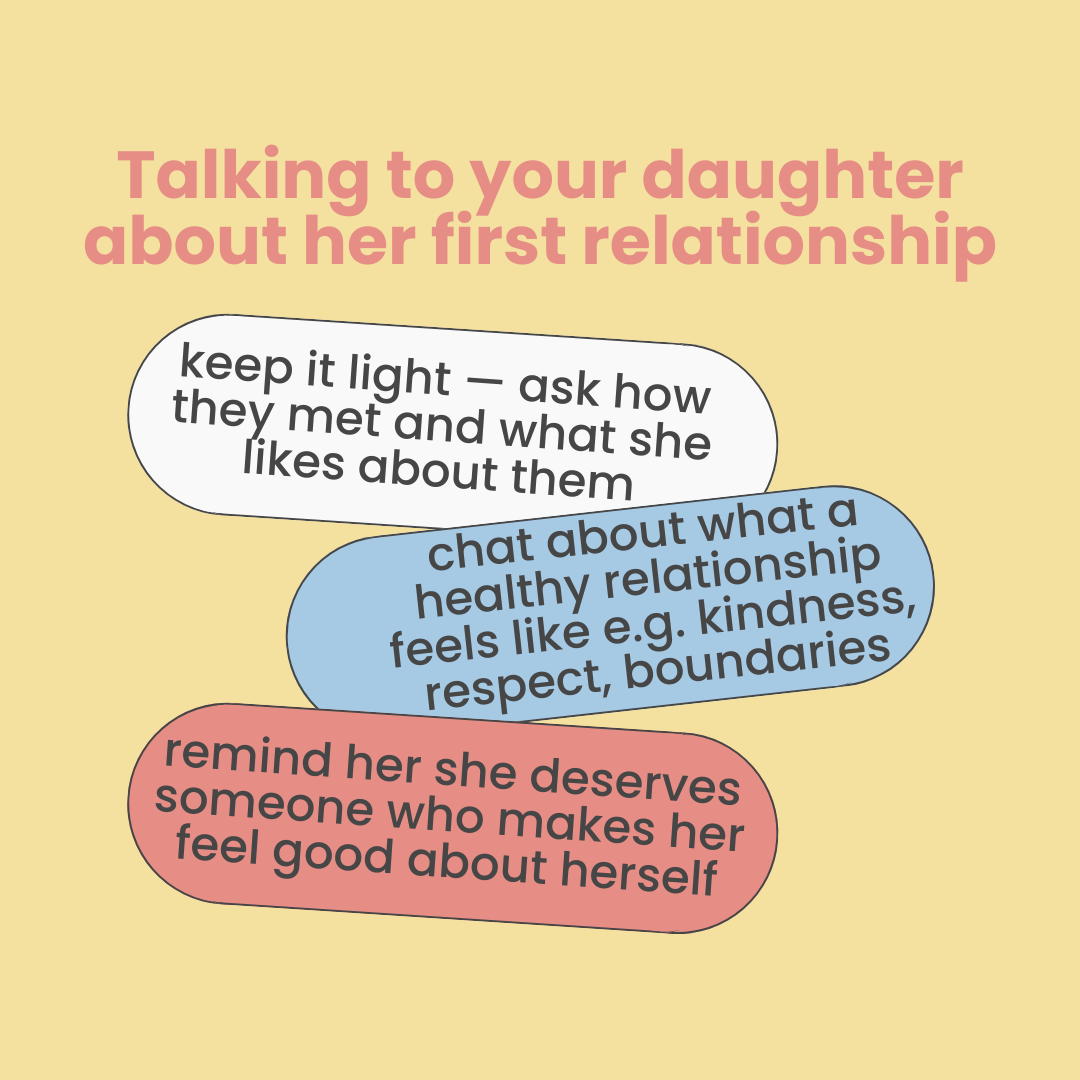Handling your daughter’s first boyfriend or girlfriend
What to say (and what not to)

Updated February 18, 2026 • Medically reviewed by Dr. Emma Dickie
Medically reviewed by Dr. Emma DickieIn this article
- How should I handle my daughter’s first boyfriend or girlfriend?
- What is the average age for a first boyfriend or girlfriend?
- How should I react when she tells me she's dating someone?
- How can I talk to my daughter about her first boyfriend or girlfriend?
- Does my approach need to change depending on the type of relationship?
- How can I show my daughter I’m on her side?
- How should I meet my daughter’s boyfriend or girlfriend for the first time?
- Why does my reaction to my daughter’s first relationship matter?
- What should I do if I’m worried about her relationship?
- How luna can help me keep the conversation going?
How should I handle my daughter’s first boyfriend or girlfriend?
Stay calm, supportive and open when your daughter tells you about her first relationship.
Showing interest without judgement helps keep communication open and makes it easier to talk about healthy relationships, boundaries and respect.
This also helps your daughter feel comfortable coming to you if she needs advice or support later.
Some families also use teen-friendly resources like luna to help young people learn about relationships privately while keeping conversations open at home.

Your daughter’s first boyfriend or girlfriend can feel like a big moment – for her and for you.
You might feel proud, protective, worried, or all of those at once.
That’s completely normal.
It’s common to wonder what age is typical, how to react, what to say, and how to help if things don’t work out.
So here’s a straightforward guide to navigating your daughter’s first relationship, keeping the conversation open and supporting her through it all.
What is the average age for a first boyfriend or girlfriend?
There isn’t a single “right” age for a first relationship, and it varies depending on maturity, personality and social group.
Many young people begin using the term boyfriend or girlfriend around 12 or 13, while others do not have a relationship until 15, 16 or older.
For most teens, early relationships are about exploring feelings and friendships rather than anything long-term.
Some young teens use relationship labels in a light or social way, and these relationships are often short-lived.
Others wait until they feel more emotionally ready before dating.
If you feel your daughter is too young, you can still talk about your expectations and values while keeping the conversation open so she can share too.
It can help to remember that first relationships are usually part of learning about emotions, communication and friendships rather than planning for the future or anything very serious.

How should I react when she tells me she's dating someone?
Respond calmly and show interest rather than reacting with teasing, panic or strict rules.
A supportive, neutral response helps your daughter feel safe talking to you about her relationship and makes it more likely she will continue sharing things with you.
If you have concerns, it is usually more effective to raise them later in a calm conversation rather than reacting strongly in the moment.
When she first tells you she’s seeing someone, it’s normal to feel protective or unsure how to respond.
Keeping your initial reaction steady helps prevent her from feeling judged or embarrassed.
A simple response such as:
- “That’s nice, tell me about them.”
- “How are you feeling about it?”
can help keep the conversation open.
Showing interest without judgement reassures her that she can talk to you honestly.
If you’re worried about her age, their behaviour, or anything else, it’s okay to bring this up later in a gentle, separate conversation rather than shutting the discussion down straight away.

How can I talk to my daughter about her first boyfriend or girlfriend?
Keep the conversation calm, curious and non-judgemental so your daughter feels safe sharing how she feels.
The goal is to understand her experience rather than control it, which helps keep communication open now and in future relationships.
When your daughter tells you she’s seeing someone, she may feel both excited and uncertain.
Your tone matters more than saying the perfect thing.
Showing interest without interrogation helps her feel that coming to you was the right choice.

How should I start the conversation without making her uncomfortable?
Starting with a gentle, neutral response helps reduce pressure and keeps the conversation open.
A calm opener shows your daughter that she won’t be teased or criticised for sharing something personal.
Simple responses can help:
- “That sounds exciting, what are they like?”
- “I’d love to hear about them when you feel like sharing.”
- “How are you feeling about it all?”
Keeping your tone steady shows her that coming to you wasn’t a mistake.
Avoid reactions such as:
❌ “You’re too young.”
❌ “Is this serious?”
❌ “You shouldn’t be dating yet.”
❌ Teasing (“Ooooh, someone’s in love!”)
These responses often make teens shut down quickly.
What questions should I ask about her relationship?
Ask open, simple questions that help you understand her world rather than make her feel questioned.
This encourages reflection and keeps the conversation relaxed.
Examples include:
- “How did you meet?”
- “What do you like about them?”
- “How do they treat you?”
- “Do your friends know?”
- “Do you feel like yourself around them?”
These questions help her think about how the relationship feels, rather than feeling she needs to justify it.
How can I talk to my daughter about healthy relationships?
A first relationship is a good opportunity to talk about respect, kindness and boundaries in a natural way.
Gentle reminders tend to be more effective than rules or lectures.
You can introduce ideas such as:
- Respect and honesty
- Giving each other space
- Feeling safe to speak up
- No pressure around affection or physical closeness
For example:
- “You deserve someone who treats you kindly.”
- “If anything feels uncomfortable, you can always tell me.”
This approach helps teens absorb values without feeling controlled.
Does my approach need to change depending on the type of relationship?
Your approach may vary depending on your daughter’s age, maturity and the nature of the relationship.
Staying flexible helps you support her appropriately while keeping communication open.
For example:
- Younger relationships (11-13): keep conversations light, as these are often exploratory
- More serious relationships (14-16+): talk more about communication, boundaries and balance
- Same-sex relationships: staying warm and accepting helps her feel safe being herself
- Online relationships: focus on safety, identity verification and moving slowly
How can I show my daughter I’m on her side?
Reassuring your daughter that you are there to support rather than control her helps maintain trust. Feeling supported makes it more likely she will come to you if problems arise.
Simple reassurance can help:
- “I’m not here to judge – I just want you to feel supported.”
- “It’s your relationship. I’m here if you ever want advice.”
This keeps the door open for future conversations.
How should I meet my daughter’s boyfriend or girlfriend for the first time?
Keep the first meeting relaxed, friendly and low-pressure so your daughter and her partner feel comfortable.
A calm, welcoming approach helps build trust and shows your daughter she does not need to hide her relationship from you.
Meeting your daughter’s boyfriend or girlfriend for the first time can feel nerve-wracking, even for calm parents.
The goal is not to assess the relationship immediately, but to create a positive first impression that keeps communication open.
How can I keep the first meeting low-pressure?
Choosing a casual setting helps everyone feel more at ease and reduces awkwardness. Short, informal interactions usually work better than formal introductions.
Good options include:
- A quick hello at home
- A school pick-up or drop-off
- A short walk to the shop
- A cup of tea at the kitchen table
Avoid situations that feel like an interrogation or a formal evaluation. Larger family meals or longer visits can come later once everyone feels more comfortable.
What should I say when I first meet them?
Starting with friendly, neutral questions helps the conversation feel natural and welcoming.
Keeping things simple shows interest without putting pressure on either of them.
You might ask:
- “How are you finding school?”
- “What do you two enjoy doing together?”
- “Do you live nearby?”
Your daughter will often notice your tone more than your words, so staying warm and polite helps build trust.
How can I avoid seeming judgemental during the first meeting?
Focus on connection rather than evaluation, even if you are quietly forming an impression.
Teens are very sensitive to disapproval and may withdraw if they sense criticism.
Try to aim for:
- Open body language
- Light conversation
- A relaxed tone
- A welcoming atmosphere
Avoid overly serious questioning, long silences, or jokes about intentions, as these can make the situation feel uncomfortable.
How can I reinforce my values without lecturing?
You can gently communicate your family values through tone and small comments rather than formal rules.
This helps set expectations without embarrassing your daughter.
For example:
- “We’re big on kindness in this house.”
- “We really value honesty with each other.”
- “We just want everyone to feel comfortable here.”
These statements signal what matters to you without turning the moment into a lecture.
Why does my reaction to my daughter’s first relationship matter?
Your reaction can influence whether your daughter feels comfortable talking to you about relationships in the future.
Responding with calm interest and support helps build trust and makes it more likely she will come to you for advice or help if challenges arise later.
First relationships are a normal part of growing up and often involve learning through both positive and difficult experiences.
By staying present, listening without judgement and showing interest in how she feels, you help her build confidence and emotional safety.
You don’t need to have perfect answers or feel completely relaxed about the situation.
Simply being available, supportive and consistent during this milestone can make a lasting difference to how she approaches relationships and communication going forward.
What should I do if I’m worried about her relationship?
Raise concerns calmly and at a separate time, rather than in the heat of the moment.
Framing worries as curiosity instead of criticism makes it easier for your daughter to open up.
You might say:
- “I might be wrong, but I wanted to check how you’re feeling about things.”
- “I noticed something earlier – can we talk about it?”
When she doesn’t feel blamed, she’s more likely to share honestly.
And if you really dislike them, you might want to read our guide on what to do if you hate your daughter's boyfriend.
How luna can help me keep the conversation going?
Teens often find it easier to talk about relationships when they’ve first explored their own feelings privately.

luna gives your daughter:
- expert-reviewed advice on healthy relationships, boundaries and breakups
- articles and videos on respect, boundaries and red flags
- anonymous Q&As so she can ask questions she may not want to ask you (we often get things like: "how do I talk to my mum about my boyfriend", for example
You can use luna as a springboard for gentle check-ins:
- “I saw luna had a video about healthy relationships – did you find it helpful?”
- “Anything interesting come up on luna lately?”
It lets you stay involved without feeling intrusive.

How we created this article:
luna's team of experts comprises GPs, Dermatologists, Safeguarding Leads and Junior Doctors as well as Medical Students with specialised interests in paediatric care, mental health and gynaecology. All articles are created by experts, and reviewed by a member of luna's senior review team.
We'd love to keep in touch!
Sign up to our parent newsletter for emails on the latest teen trends, insights into our luna community and to keep up to date
By signing up, you are agreeing that we can use your email address to market to you. You can unsubscribe from marketing emails at any time by using the link in our emails. For more information, please review our privacy statement.